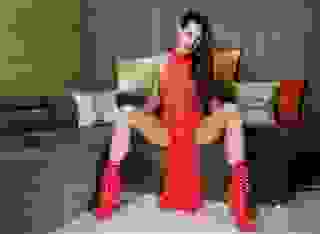- Romance
- Spring Green
- Page 5
Note: You can change font size, font face, and turn on dark mode by clicking the "A" icon tab in the Story Info Box.
You can temporarily switch back to a Classic Literotica® experience during our ongoing public Beta testing. Please consider leaving feedback on issues you experience or suggest improvements.
Click hereHad to be!
Now, standing on the platform I felt a great ruse stood ready, and had indeed been waiting for some time, to be uncovered.
Hundreds of smiling faces, each wanting to say hello and bid us a warm welcome, waited beneath the soft medieval-blue sky. The train pulled away from the station, stranding us, leaving us no ready line of retreat, so blinking in the light we turned to confront Chuck's past.
+++++
21 April 1945
Strong-armed men reached down and pulled him dripping from the canal. He was blue, cold and shaking, machine gun fire echoed off nearby buildings, small explosions drifted through the cool air -- carrying acrid smoke everywhere. The girl, the one who had fainted dead-away, had been roused by his calls for help; she had struggled to her feet and looked down at him then run away as fast as she could.
Addington looked at the men; they smiled as they pulled him up to the tow-path.
The girl must have summoned them... he'd have to find her and thank her.
"We go!" one of the men said. "Fass! Dee Chor-mans, dey comink!"
Addington understood. Dripping wet and shivering, muscles aching and his tail-end hurting, he followed them down the stone tow-path until they ducked into a building. They were in sudden darkness and he couldn't see a thing but the men guided him to a room and led him inside. They moved a huge stack of wooden crates and another passage was revealed; a few remained behind to seal off the escape route while Addington and his escort resumed their journey through what had to be an underground warren.
"You go there," the toothless old man said, pointing to a heavy wooden door. "Go! There!" He turned and left; Addington went to the door and opened it. The room was well-lit, a radio set hummed against one wall, several men dressed in black, their faces blacked-out as well, sat eating bread and drinking beer.
One of the men motioned to a chair: "Come. Sit and have some cheese."
"Right." Addington pulled up the chair and the man passed him a hunk of bread and cheese and a tankard of ale. Addington ate.
"You the pilot?" one of the men said -- in decent English.
"Guilty as charged, Your Honor," Chuck Addington replied. No one laughed.
"Good shooting. My name is Yves." The man held out his hand and Addington took it.
"Charles the first," Chuck replied. "King of the Mustang Pilots."
"Well Charles, if you had not happened along I'm afraid we'd all be very dead. Thank you."
"Just doing my job, amigo."
"The pilot? Of the German plane? We got him out. A kid, not old enough for even a mustache! Can you believe it!" Yves shook his head in disgust. "You want to see him?"
"Not really," Addington said. He chewed the bread and took a sip of the warm beer. "Can you get me out of here?"
"There is no need."
"What?"
"Germans are laying down their arms all over the place now, yet a few fight on. Like these pigs this morning. There were a few hundred until you came along. Now maybe thirty or forty remain. Some British troops are on the way; they will be here soon then you can catch a ride with them."
Addington nodded. "Good bread," he said.
"I'm sorry we have no dry clothes for you..."
The ground shook, dust and dirt rained down from the ceiling, and Yves and the other man looked up.
Two more concussions, far away, then another almost over head, this one with shattering intensity. Men running. Shouted confusion. The door bursts open. Men explain, Yves listens, gives orders.
"I'm sorry, perhaps you'll like to stay a while. The German has decided to counter-attack, the axis of movement is down the valley along the river. My men report several hundred men are approaching, and perhaps a dozen tanks."
Addington nodded, smiled.
"Why do you smile like this," Yves said.
"I guess you never know, do you? What people will do when there backs are against the wall."
"No, I suppose not." Yves grinned, nodded. "Indeed. Will you stay down here in the dark, or would you like to go fight some more Germans?"
Addington grinned. "I thought you'd never ask."
+++++
21 April 2005
Lunch was to take place in a reception hall at the university; we rode with the Mayor in his car.
"So, how was your journey?" the young, well dressed and, if Maddie's non-stop sidelong glances were any indication, handsome Mayor asked. "Any delays?"
"Well, no, but this is all a bit of a surprise?" I think I managed to say.
"A surprise, yes. I understand. Charles was..." he paused, as if he was searching for just the right word. "He was a bit of a character, sometimes. Yes."
Okay buddy, you win the understatement of the year award, hands down. "Uh-huh," I mumbled, my mouth slow and unsure of itself.
The mayor's car turned down the Avenue de Addington and my stomach flip-flopped; Maddie turned and looked at me, her eyes growing wider and wider.
I shrugged. What the hell else could I do?
She shrugged too.
And friend Stephen picked his nose.
"We will have some lunch with interested people," the Mayor continued, "then we will walk down to the boat..."
"Excuse me, but is this street named after my uncle?"
The mayor looked at me like it was simply stupid of me to waste his time on the obvious: "Yes, of course."
"Oh."
+++++
21-22 April 1945
The first firefight had been a fast, furious affair, but it had simply been a probing maneuver by advanced units of the German counter-offensive, and no one had been hurt -- on either side. Now, with night coming-on Addington could hear a large column of German armor coming down the valley toward the town.
Breathless reports came in, sightings of over a hundred tanks drawing near and more massing west of Saint-Vit to join the assault, troops in division strength. The town was in peril, there was no time to lose.
No official history of the night's action remains; it was an insignificant battle in the greater scheme of things and of importance only to those who took part in it. The real war was being fought along the Rhine far to the north and east; the Americans and British were racing for Berlin, trying to get there ahead of the Red Army. Allied forces were overrunning concentration camps and encountering the remnants of unspeakable horror as Adolph Hitler crawled down into a shadowless earth to, presumably, end his life. A great war was ending, a new era beginning; the running battle that developed along the southern bank of the river Doubs the night of 21 April was but one of the dying beast's death spasms, a furiously ill-conceived attempt by remnants of the German General Staff to divert Allied Army units from their final objective. That the attempt ultimately failed was of little interest to those who would study the war in years to come, but of intense interest to the citizens of small towns along the river Doubs.
All that stood between the town and the massed German infantry and armor that approached along the south side of the river was a handful of bridges; to keep the Germans from taking the town these bridges had to be destroyed. A handful of resistance fighters and British commandos worked through the night to cut off this advance, the German counter-offensive stalled and Allied air forces attacked before the Germans could regroup. Bridges could and would be rebuilt; everyone knew it is much more difficult to rebuild a thousand years of history...and these were a people who justly cherished their past.
Chuck Addington was one of those men who fought that night, one of those who helped save the town, though he was one of the few who had nothing to gain and everything to lose. He wasn't a proud son of the town or a local resistance fighter, but that didn't matter to him, or to the people who lived and loved there; here was a people facing ruin and in need of his strength, and as all he had to give was that strength he gave it gladly, and overnight he became something of a local hero.
The details are sketchy at best. Addington and a group of local partisans took out the bridge at Brevans in the early evening, the bridge at Rochefort-sur-Nenon fell just before midnight; the German formation rushed for the town but had been kept on the far side of the river and bogged down at a natural choke point near the village of Azans. The Germans rushed engineers to the front to span the river and take the town, but resistance fighters, among them Captain Addington, harassed them all through the night with sniper fire and grenades. As the sun rose on the 22nd a formation of low-flying American B-26 bombers arrived and decimated the German formation. The battle was over before it really began.
And Captain Charles Addington remained in the town for some time -- a few weeks, anyway; he had not deserted the military, he just did as the locals suggested and waited for the war to catch up to him. He waited for allied forces to secure the area, only he had no idea their arrival would not happen for three weeks, after the armistice ending the war was signed.
And it was during this three week period he met the girl he had startled when he tumbled from the rooftops, trailing a ripped and shredded parachute, and fell so ungraciously into the Canal des Tanneurs.
+++++
21 April 2005
"It was an impossible night," Yves Bertand continued, "impossible. There were so many of them, they just kept coming and coming...at one time more than we could count."
Though there were, I think, about a hundred people in the room having lunch with us, every one of us was focused on this old man's retelling of events that night in 1945.
"They were shooting their tanks at us, their machine guns, and we would change our location and start shooting Germans again. On and on it went, until your uncle figures out their tactic. They were pushing us away from town, and we were all that was left protecting the river. It was your uncle who broke off from the main group, and I went with him. He was a brilliant fighter, by the way. Did you know that, William?"
"I don't know what to say, Yves. As I've said, he never talked about the war..."
"But of course he wouldn't, he was never the sort to boast. But he was the man of action, was he not? I mean, in business? He was very successful, no?"
"Yes, he was. At business." And need I have said, at life too?
"So you see, he remained the brilliant fighter! He never changed, did he? He was not the sort to give up! No, not our Charles!"
Our Charles. Our Charles. So that was it. They had laid claim to him, at the end of his journey. Uncle Charles was a part of their history, a solid, vital part of an ongoing, evolving mythology. And no, he never did change; he remained cunning and protective, merciless and loving, for the rest of his life. Indeed, right up into the very last moment of his life -- and, no doubt, beyond.
"We got back just in time, too, William. The German were firing lines across the river, big thick ropes; they were going to pull some sort of bridge across, a floating thing, very clever. Men were swimming the river -- it is still very cold this time of year, too -- and no doubt they would have been successful had we not returned when we did..."
"Why was that so important?" I asked, and a pall came over the room. Yves shook his head -- I was the stupid student who refused to grasp the obvious.
"But don't you see? If the Germans had taken the town, when the bombers came they would have destroyed everything! The town would be no more!" He held his hands out and waved them around the room, gestured at stonework that was probably a thousand years old. "You saw the street, yes? The street named after your uncle? At the bottom of this street, down by the river," and he pointed toward what I assumed was the river, "that is where our Charles made his stand. From there, he and the few of us with him stopped the Germans!" The old man told the story of that night as if it had happened just hours ago. He spoke a narrative that will slip into the realm of myth, but for now held the immediacy of personal tragedy. He spoke for some time, and we listened.
"And then the bombers came?" Madison asked when Yves was at an end.
"Precisely!" the old man said quietly. "You understand the night now. What Charles did for us."
"But why," I interrupted, "did the Germans want to take the town? What was so important here?"
"Here? Nothing, but beyond lay the center of France, the route from Paris to Lyon. Who knows what was in the German mind? Perhaps to drive a wedge into the heart of France and force a change of strategy? It doesn't matter though, does it? Charles stopped them from destroying our town."
I nodded. "I had no idea. Extraordinary!"
"We must leave," the Mayor said, standing and looking at his watch. "Time to go to the river, to the boat."
"But! But when are you going to..." Yves protested, and the Mayor cut him off:
"When it is time!" the Mayor whispered harshly. "Not now!"
Well, I love a mystery as much as the next fellow...
+++++
22 April 1945
He slept well into the afternoon, his body spent and beyond the grip of mere exhaustion. He had come back to Yves Bertand's house and crawled up an interminable number of stairs and flopped down on a bed made of straw and horsehair and passed out. The others in the house left him alone, let him sleep, but soon everyone was talking about what the stranger had done during the night. People came by Bertand's house to see the man and thank him for saving the town, but still he slept and no one would even think of disturbing him.
He woke late that afternoon, as evening came to the town once again. He stood too quickly and slammed his head on the sloped ceiling of the attic room and he cursed loudly: "Piffle!" he said. "Where the fudge am I?" He found his way to the stairs and looked at them, then remembered where he was and what he'd done during the night -- and his surroundings rushed inward and real focus returned to his mind. His need to use the bathroom was, however, pressing -- so he galloped down the stairs.
"Yves! Hello! Anybody home?" he shouted in his New England accent.
And there had indeed been someone home, Charles Addington found as he tromped down the wooden stairs. The girl from the river was home.
She had a tray of food and coffee, stood wide-eyed looking at the giant American as he thundered down the stairs and shuddered to a stop.
"Excuse me, but I really, really need to find a bathroom!"
The girl looked at him, her apparent confusion evident. He tried to remember the little French he'd learned in school.
"Excusez-moi, ou sont les toilettes? S'il vous plait, vite!"
The girl bit her lip and stifled the little laugh she felt rising: "Venez, de cette facon!" She led him down the stairs to the ground floor and to the little room and pointed: "La bas! De la bas!"
"Merci," Addington said as he hopped into the room, "Vous avez sauve ma vie!"
He came out a while later and the girl had laid out his 'breakfast' on a small yellow table in the kitchen; Yves was sitting there, drinking black coffee and rubbing his eyes when Addington walked in.
"God but I'm tired, and I feel like shit!" Bertand said. His eyes were glowing red orbs, his skin sallow, almost lifeless.
"You look it, too!" Addington sniffed the air as he took the offered chair. Cheese, some ham and bread, coffee. The food looked old and past its prime but he knew it was probably the best they had; life in Vichy France had been pleasant for the few who collaborated with Germans but very hard for everyone else. He took a little and ate. He sipped the coffee and tried not to choke; the stuff tasted like it had been made from ground acorns and squirrel shit.
"Another column of British went by an hour ago; they are chasing the German retreat back toward Saint-Vit. I think they are finished now, at least here. There are many prisoners."
"Prisoners?" Addington gulped. "Who's going to take care of prisoners?"
Bertand shrugged. "The British, I suppose. Not us. We have no room here."
The girl hovered just out of range, listened and tried to understand but her English was spotty at best; Addington tried to ignore her but found he couldn't; his eyes kept drifting to her eyes. They were lovely.
"Who's the girl?" he asked when he could stand it no more.
"Oh! Pardon! My little sister, Marie-Claire." Yves turned, made introductions; the girl blushed but took Charles' offered hand. "She says she thinks you are not a very good swimmer!"
"Ah! Well, tell her I did the best I could under the circumstances. Sorry I scared you." he turned back to Yves. "So, this is your house?"
"My family's, yes. We have lived four hundred years here, at least."
"In this town, you mean?"
"Yes, yes, but in this house four hundred years, that we know of. Before that, we lived on the outskirts of town. I can show you if you like. Later."
Addington shook his head. What kind of history guided the lives of these people! Time did not simply mark the seasons of life, time was the very fabric of life. Yves was clothed in this fabric, his sister, this house; everything he saw had been woven by time into the fabric of this town until all that remained was a brilliant tapestry.
To be cherished and preserved -- at all cost.
"Where are your mother and father?"
"Mother is at the market. We heard a rumor there might be some fresh carrots and she could not take a chance on missing, you understand?" The season of renewal. Spring. Winter's crops would be coming in, an autumn harvest planted, and life would go on, the tapestry renewed.
"Yes." He knew. And yet, Yves hadn't mentioned his father and Addington knew not to press. So many had died during the war -- it remained far better to let these things remain unsaid -- and yet the girl turned away to hide her grief.
They left after a while, walked down to the river and looked across the smooth water to the smoldering carnage wrought by the bombers -- and him; the air smelled of burned rubber and cooked meat and Addington wanted to turn away when he realized the full extent of what lay across the river. The ground beneath his feet was a wasteland of stone, rubble, spent shell casings -- and blood; the walls of houses everywhere he looked were pockmarked, windows speckled with tiny holes striated with spidery cracks held the last of the day's sun.
"So much waste," he said as he looked over the battlefield.
"Oui, so many boys perished last night," Bertand said as he waved away the spirit of death that threatened to overwhelm him. "All to quench a madman's hate -- his thirst for revenge."
"We can be a sorry lot, can't we?"
Bertrand turned to look at the university, at the tower: "But we are capable of great things to, when we put our minds to better use."
Bertand looked at Addington for a long time before speaking again.
"And what of you, Charles? Will you find your way back to the war now?"
Addington shrugged. "I fought all the war I wanted last night."
"Yes, it is a little exciting, isn't it?" Yves turned back to the river and pointed at the wasteland of twisted iron and burned flesh: "But that is the reality of war. That is..."
"...The reality of Hell."
"Precisely. It is best not to make a home there, in your heart, for Hell? Better to turn away from hatred? All hatred, in all it's many forms."
Addington stayed at the Bertand house that night and many more that followed. He grew close to Yves' mother, her soft smile and kind eyes, the way she naturally took care of him as she took care of her own children, in spite of her grief. Yves Bertand soon became like a second brother and Addington helped the townsfolk as they cleared away rubble and debris -- and more than a few bodies -- from the cratered streets and collapsed buildings that scarred the town. While he worked he thought of Ruth back in the States and all they had dreamed of doing together when he returned -- yet -- all that seemed so far away, like fragments of a once forgotten dream or wispy memories of a life that might have been, but wasn't.








